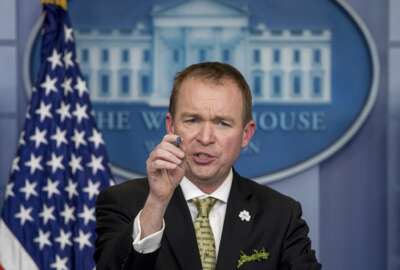

United provides a lesson learned in sub-optimal customer experience.
The viral United Airlines incident got me thinking: As the Trump administration follows through on a plan to improve how the government serves citizens, it won’t have a high bar with United Airlines and the Chicago airport police as a model.
Today the Office of Management and Budget will release more detailed guidance to agencies on how they should go about drafting their reorganization proposals. I’m going to presume this will have some connection with the White House Office of American Innovation, which President Donald Trump established — in writing if not yet in actuality — at the end of March.
I’m also presuming that one goal of the grand-design reorganization will be better delivery of service. The “service to the citizen” movement dates to the George H. W. Bush administration. It and the subsequent administrations have all, in their own way, moved that ball down the field.
Customer experience — a word coming into vogue over the last few years and adopted by the Obama administration — embodies the totality of what a person encounters from beginning to end of a transaction; and not merely whether the transaction itself was successful.
In this column I’m talking about the in-person experience. I’ll be covering the wide variations in online in a future piece. Although every administration has cited the high standards set by the private sector, can we agree service in the private sector … varies?
Example: Opening Day at the Washington Nationals. The game took place. It started on time. The Nats won. The urinals flushed. But the total experience was pretty bad. Food lines cost standees in line two or three innings. Concession stands ran out of hot dogs, for Pete’s sake! ATMs were devoid of functionality. Management fouled up distribution of the giveaway, a mechanical eight ball — a serious matter for many baseball fans who (like me) collect these gew-gaws.
I mentioned United Airlines. Few other industries provide such as extreme range of customer experiences, from the horror of middle-seat-in-coach-bad-weather-delayed to the fabulous pampering of international first class. Most of us must choose pretty much among the drearily similar. When it comes to buying everything from shows to cars, it’s a wide-open world.
In the public sector, the very idea of state bureaus for vehicles — DMVs, RMVs, MVAs, they go by various names — conjure up a nearly autonomic negative reaction in people who have to go to them. In the 1970s, the “Registry” in Massachusetts was so dysfunctional it turned into a political issue. Loathing of the Registry became part of Bay Staters’ limbic systems.
To their credit, state governments over the years have transformed their motor vehicle operations, to the extent possible given the highly regulated, legalistic nature of the ownership and operation of vehicles.
I cite my own recent experiences with the MVA in Maryland. Considering the sheer volume of transactions it handles and the detailed processes legally required for each transaction, I’d have to give it high marks. Yes, there’s a line for checking in and getting your bakery-style queue number. Then you wait for your number to be called. I waited for 90 minutes one afternoon. There’s plenty of roomy seating for while you do wait, even if the curved steel benches seem suited to a prison commons. The MVA provides free WiFi. I found, things generally go smoothly once you get to your appointed counter.
One important factor: The people. The several I encountered were genuinely friendly and eager to help. I found them as pleasant as a barista, in a situation where people have to be there. In fact, I made a friend. One week I was there to get a driver’s license with my newly acquired “M” designation. The next week I had to register, plate and title my bike. The young woman who’d issued me the license was assigned to the sign-in desk on my second visit. I got a big grin and a question, “What brings you back this week?”
A profound difference separates government at all levels and the private sector. Namely, in the private sector you have choice. I’ll still go to 25 or so Nats games this year, even if they did louse up their Opening Day customer experience. Most the time, the team provides a dandy customer experience. I like it there. I have an aisle seat and I can spit my sunflower seed shells into the aisle, like a parrot.
But if I want to drive a motorcycle, legally anyhow, I have no choice other than to deal with the MVA. To the extent agencies can administer the law efficiently, fairly and pleasantly they enlarge their support and sense of legitimacy. Good people leave people feeling good.
Copyright © 2025 Federal News Network. All rights reserved. This website is not intended for users located within the European Economic Area.
Tom Temin is host of the Federal Drive and has been providing insight on federal technology and management issues for more than 30 years.
Follow @tteminWFED

